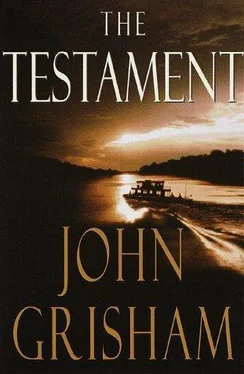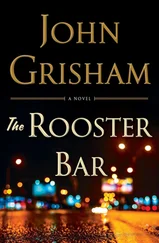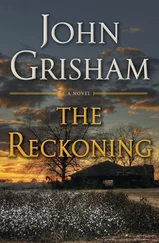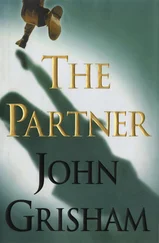She could turn her back on the world, but she would always be the daughter of Troy Phelan. That in itself required some small measure of cooperation. Nate practiced his arguments out loud. Jevy couldn’t hear him.
He would tell her about her siblings. He would paint a dreadful picture of what would happen if they received the entire fortune. He would list the worthwhile causes she could advance if she simply signed the trust. He practiced and practiced.
The trees on both sides grew thicker and leaned over the river where they touched. Nate recognized the tunnel. “Up there,” Jevy said, pointing ahead to the right, to the spot where they had first seen the children swimming in the river. He throttled down, and they eased by the first settlement without seeing a single Indian. When the huts were out of sight, the river forked and the streams became smaller.
It was familiar territory. They zigzagged deeper into the woods, the river looping almost in circles, the mountains occasionally visible through clearings. At the second settlement, they stopped near the large tree where they’d slept the first night, back in January. They stepped ashore in the same spot where Rachel had stood when she’d waved good-bye, just as the dengue was calling. The bench was there, its cane poles lashed tightly together.
Nate was watching the village while Jevy was tying off the boat. A young Indian ran along the trail toward them. Their outboard had been heard.
He spoke no Portuguese, but through grunts and hand signals conveyed the message that they were to stay there, by the river, until further orders. If he recognized them, he didn’t show it. He appeared scared.
And so they took their places on the bench and waited. It was almost 11 A.M. There was a lot to talk about. Jevy’d been busy on the rivers, running chalanas with goods and supplies into the Pantanal. He occasionally captained a tourist boat, where the money was better.
They talked about Nate’s last visit, how they’d raced in from the Pantanal with Fernando’s borrowed motor, the horrors of the hospital, their efforts to find Rachel in Corumbá.
“I tell you,” Jevy said, “I have listened much on the river, and the lady did not come. She was not in the hospital. You were dreaming, my friend.”
Nate wasn’t about to argue. He wasn’t sure himself.
The man who owned the Santa Loura had been slandering Jevy around town. It sank on his watch, but everyone knew the storm did it. The man was a fool anyway.
As Nate expected, the conversation soon swung around to Jevy’s future in the States. Jevy had applied for a visa, but needed a sponsor and a job. Nate bobbed and weaved, and slid enough punches to keep his friend confused. He couldn’t muster the courage to tell him that he too would soon be looking for work.
“I’ll see what I can do,” he said.
Jevy had a cousin in Colorado who was also looking for a job.
A mosquito circled Nate’s hand. His first impulse was to crush it with a violent slap, but instead he watched to gauge the effectiveness of his super-repellent. When it tired of surveying its target, it made a sudden nosedive toward the back of his right hand. But two inches away, it suddenly stopped, pulled away, and vanished. Nate smiled. His ears, neck, and face were lathered with the oil.
The second attack of dengue usually causes hemorrhaging. It’s much worse than the first, and often fatal. Nate O’Riley would not be a victim.
They faced the village as they talked, and Nate watched every move. He expected to see Rachel stride elegantly between the huts and along the path to greet them. By now, she knew the white man was back.
But did she know it was Nate? What if the Ipica had not recognized them, and Rachel was terrified that someone else had found her?
Then they saw the chief slowly walking toward them. He carried a long ceremonial spear and was followed by an Ipica Nate recognized. They stopped at the edge of the trail, a good fifty feet from the bench. They were not smiling; in fact, the chief looked particularly unpleasant. In Portuguese, he asked, “What do you want?”
“Tell him we want to see the missionary,” Nate said, and Jevy translated it.
“Why?” came the reply.
Jevy explained that the American had traveled a great distance to be there, and that it was very important to see the woman. The chief again asked, “Why?”
Because they have things to discuss, big things that neither Jevy nor the chief would understand. It was very important or else the American wouldn’t be there.
Nate remembered the chief as a loud character with a quick smile, a big laugh, and a trigger temper. Now his face had little expression. From fifty feet his eyes looked hard. He had once insisted they sit by his fire and share his breakfast. Now he stood as far away as possible. Something was wrong. Something had changed.
He told them to wait, then left again, slowly making his way back to the village. Half an hour passed. By now Rachel knew who they were, the chief would have told her. And she was not coming to meet them.
A cloud passed in front of the sun, and Nate watched it closely. It was puffy and white, not the least bit threatening, but it scared him nonetheless. Any thunder in the distance, and he’d be ready to move. They ate some wafers and cheese while sitting in the boat.
The chief whistled for them and interrupted their snack. He was alone, coming from the village. They met halfway, and followed him for a hundred feet, then changed directions and moved behind the huts on another trail. Nate could see the common area of the village. It was deserted, not a single Ipica wandering about. No children playing. No young ladies raking the dirt around the dwellings. No women cooking and cleaning. Not a sound. The only movement was the drifting smoke of their fires.
Then he saw faces in the windows, little heads peeking through doors. They were being watched. The chief kept them away from the huts as if they were carrying diseases. He turned onto another trail, one that led through the woods for a few moments. When they emerged into a clearing, they were across from Rachel’s hut.
There was no sign of her. The chief led them past the front door, and to the side, where, under the thick shade trees, they saw the graves.
The matching white crosses were made of wood and had been carefully cut and polished by the Indians, then lashed together with string. They were small, less than a foot tall, and stuck into the fresh dirt at the far end of both graves. There was no writing on them, nothing to indicate who had died, or when.
It was dark under the trees. Nate put his satchel on the ground between the graves, and sat on it. The chief began talking softly and quickly.
“The woman is on the left. Lako is on the right. They died on the same day, about two weeks ago,” Jevy translated. More words from the chief, then, “Malaria has killed ten people since we left,” Jevy said.
The chief delivered a long narrative without stopping for any translating. Nate heard the words, yet heard nothing. He looked at the mound of dirt to the left, a neat pile of black soil laid in a perfect little rectangle, carefully bordered by shaved limbs four inches round. Buried there was Rachel Lane, the bravest person he’d ever known because she had absolutely no fear of death. She welcomed it. She was at peace, her soul finally with the Lord, her body forever lying among the people she loved.
And Lako was with her, his heavenly body cured of defects and afflictions.
The shock came and went. Her death was tragic, but then it wasn’t. She wasn’t a young mother and wife who left a family behind. She didn’t have a wide circle of friends who’d rush to mourn her passing. Only a handful of people in her native land would ever know she was gone. She was an oddity among the people who’d buried her.
Читать дальше












